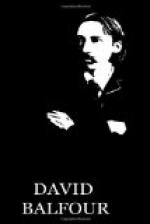“Mr. David,” said he, “I have a piece of news for you. It concerns some friends of yours, of whom I sometimes think you are a little ashamed, for you have never referred to their existence.”
I suppose I blushed.
“I see you understand, since you make the answering signal,” said he. “And I must compliment you on your excellent taste in beauty. But do you know, Mr. David, this seems to me a very enterprising lass? She crops up from every side. The Government of Scotland appears unable to proceed for Mistress Katrine Drummond, which was somewhat the case (no great while back) with a certain Mr. David Balfour. Should not these make a good match? Her first intromission in politics—but I must not tell you that story, the authorities have decided you are to hear it otherwise and from a livelier narrator. This new example is more serious, however; and I am afraid I must alarm you with the intelligence that she is now in prison.”
I cried out.
“Yes,” said he, “the little lady is in prison. But I would not have you to despair. Unless you (with your friends and memorials) shall procure my downfall, she is to suffer nothing.”
“But what has she done? What is her offence?” I cried.
“It might be almost construed a high treason,” he returned, “for she has broke the King’s Castle of Edinburgh.”
“The lady is much my friend,” I said. “I know you would not work me if the thing were serious.”
“And yet it is serious in a sense,” said he; “for this rogue of a Katrine—or Cateran, as we may call her—has set adrift again upon the world that very doubtful character, her papa.”
Here was one of my previsions justified: James More was once again at liberty. He had lent his men to keep me a prisoner; he had volunteered his testimony in the Appin case, and the same (no matter by what subterfuge) had been employed to influence the jury. Now came his reward, and he was free. It might please the authorities to give to it the colour of an escape; but I knew better—I knew it was the fulfilment of a bargain. The same course of thought relieved me of the least alarm for Catriona. She might be thought to have broke prison for her father; she might have believed so herself. But the chief hand in the whole business was that of Prestongrange; and I was sure, so far from letting her come to punishment, he would not suffer her to be even tried. Whereupon thus came out of me the not very politic ejaculation:
“Ah! I was expecting that!”
“You have at times a great deal of discretion too!” says Prestongrange.
“And what is my lord pleased to mean by that?” I asked.




